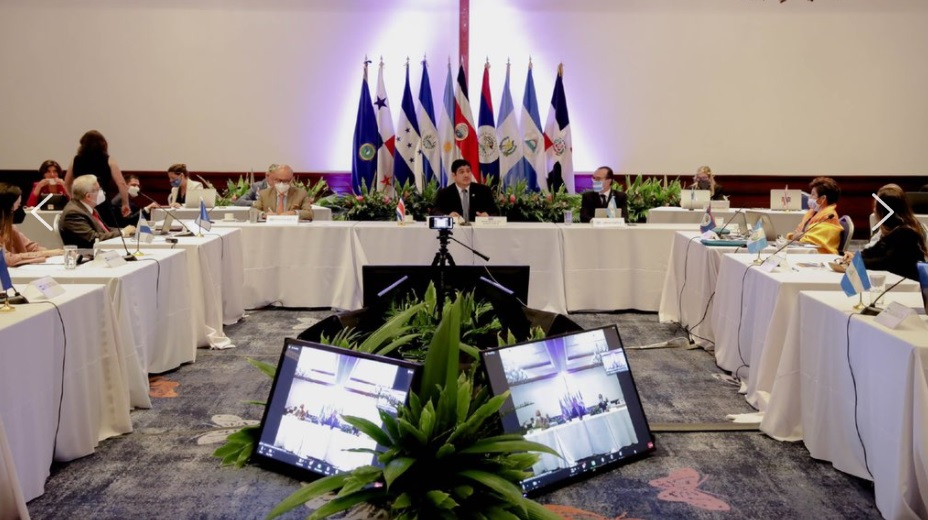The European Union EUROsociAL+ programme has supported the SICA Regional Integrated Social Policy (PSIR-SICA) 2020-2040 and the Plan for Recovery, Social Reconstruction and Resilience in Central America and the Dominican Republic (3R Plan).

SICA heads of state and government
At the 55th meeting of the heads of state and government of the SICA member countries, Juan Luis Bermúdez, the chief of human development and social inclusion, executive president of the Mixed Institute of Social Assistance and pro tempore president of the Central American Social Integration Council (CIS), accompanied by SISCA Secretary General, Anita Zetina, had the opportunity to highlight the most recent advances in the regional social integration process in the current situation faced by the countries, with a view to the construction of a new region within the framework of the Central America Bicentennial.
Minister Bermúdez emphasised that the route to reducing inequalities via the 2030 Agenda and to recovery from the socioeconomic impacts of COVID-19 in Central America and the Dominican Republic are set out in two instruments which have had a significant impact, namely the SICA Regional Integral Social Policy (PSIR-SICA) 2020-2040 and the Plan for Recovery, Social Reconstruction and Resilience in Central America and the Dominican Republic (3R Plan).
“Within the framework of the Bicentennial, Central America is revamping its regional social integration process, putting people at the centre, especially the most vulnerable. Strengthening the social security and protection system, the employability of young people and women, food security, comprehensive care for informal settlements, social risk management in the face of the climate crisis, are all key aspects on an agenda that now calls on us to work together and forge alliances with friendly countries and international organisations, to guide the new Central American reality. This should not be the product of inertia, but the result of our determination to achieve social justice” added Juan Luis Bermúdez.
The SICA heads of state and government celebrated the approval of the PSIR-SICA promoted by the Central American Social Integration Council (CIS), highlighting the importance and centrality of the social dimension in the integration process.
They expressed their support for the social policy and the 3R Plan, as well as the proposal to create the “Bicentennial Fund”, which is currently being assessed by the Central American Bank for Economic Integration (CABEI) as an instrument for implementing the PSIR-SICA, within the context of recovery from the effects of the pandemic and the impact of adverse weather events that affected the region in 2020.
They also highlighted the importance of working together with SICA’s General Secretariat to support the social coordination efforts to be undertaken by the CIS and SISCA for dissemination, execution and follow-up tasks, along with the other regional institutions.
Through these instruments, the aim is to contribute to resilience as a response not only to the effects caused by COVID-19 but also to the impact of hurricanes Eta and Iota, which serve to demonstrate the climate vulnerability of the region.
The PSIR-SICA and the 3R Plan are the result of the joint effort by the SISCA at the initiative of the CIS, supported by the Central American Council for Housing and Human Settlements (CCVAH) and the Council of Central American and Dominican Republic Employment Ministers (CONMINTRAB), with the support of the EUROsociAL+ programme and the advice of FAO, ILO and UN-Habitat.
Meeting of the SICA Council of Ministers of Foreign Affairs.
Prior to the Summit of Heads of State and Government of the SICA member countries, Juan Luis Bermúdez presented the PSIR-SICA and the 3R Plan to the 85th Meeting of the SICA Council of Ministers of Foreign Affairs.
The Foreign Ministers expressed their support for both instruments and highlighted the importance of their implementation in light of the challenges that countries face as part of the health, social and economic crisis caused by COVID-19 and climate vulnerability in the region and aggravated by structural pre-pandemic elements such as inequality and extreme poverty.
Source: Costa Rica SISCA and IMAS.



